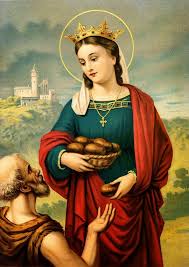HOMILY WEEK 13 04 – Year II
Faith, Forgiveness and Deeper Healing:
Optional Memorial of St. Elizabeth of Portugal
(Amos 7:10-17; Ps 19; Mt 9:1-18)
*************************************************
Have you ever wondered what it would be like to be paralyzed?
The gospel today invites us to place our faith in Jesus and come to him for forgiveness and deeper healing.
The paralyzed man in the gospel can symbolize our wounded humanity. All of us are sinners, falling short of the persons God has created us to be. And all of us stand in need of healing of our sinfulness, that which makes us sin. Many of us are even to some extent paralyzed by feelings of guilt or shame.
It is significant that Jesus came to his home town, and that the common people there believed in him. “Seeing their faith,” he responded with forgiveness and healing. It is the scribes and the religious leaders who, in their false pride and stubborn self-will, always refused to believe in Jesus.
There is a reminder here of the importance of intercessory prayer. That prayer has its place, and carries with it the power to make a difference in peoples’ lives, as it did in the life of the paralytic. St. Monica prayed for over twenty years for the conversion of her wayward son, Augustine, and finally her prayers were heard. He not only came to believe in Jesus, received his forgiveness and healing, but also became one of the church’s greatest saints.
Jesus surprises and shocks especially the scribes by first extending forgiveness to the paralytic. Jesus asserts he did this to show them that the Son of Man has authority on earth to forgive sins. The title Son of Man means he is the Word made flesh, divine and human.
The fact that Jesus then goes on to heal the paralytic reveals that he is also the long-awaited Messiah, who was to come with a two-fold mission – to redeem and to sanctify; to forgive and to heal. That healing is important for us in our own lives. A spirituality of weeding can help us grasp what is a stake here. I love gardening and have learned to “root weed” as the best way to control weeds. If they are cut off at the surface with a hoe, leaving the roots intact, they will just grow back again. But if they are pulled out by the roots, they are gone and will not grow back again.
Actually, root weeding this way has become a spiritual experience for me, especially when I am trying to get rid of the jungle of thistles at our Oblate cottage at Jackfish Lake. When I manage to pull out a thistle with a long root, I feel a great satisfaction – that weed will never grow back. I get a sense of how God must feel when someone genuinely repents, confesses his or her sin and seeks to make amends. That sin is forgiven, gone, no longer exists, because God assures us God will not only deal with our iniquity, but will not remember our sins (Hebrews 8:12). So, when God forgives, God forgives – that sin no longer exists.
However, unless we also experience healing of the root of our sin (our sinfulness, that which makes us sin – our painful emotions and negative attitudes) we will just go on repeating the same sins. When we come to Jesus for healing of our sinfulness, then there is change, transformation, conversion – we will not sin that way to the same degree again. And that is the core of the Good News of Jesus Christ, something we can truly celebrate.

St. Elizabeth of Portugal
The Church today honours someone who lived these teachings in an exemplary manner – St. Elizabeth of Portugal. Born in 1271, she was Daughter of King Peter III of Aragon and named after her great-aunt, St Elizabeth of Hungary. Her birth prompted a reconciliation between her father and grandfather. Thus began her reputation for bringing peace; she came to be called “the Peacemaker.” She was married at age 12 to King Denis of Portugal, by whom she had two children. She set up hospitals, orphanages and other institutions, patiently endured her husband’s infidelities, forgiving him and also providing for the education of his illegitimate children. She also acted as a peacemaker in the quarrelsome and complicated politics of the time. When her son twice led rebellions against his father, she helped them reconcile.
On her husband’s death in 1325 she retired from public life, joined the Poor Clares, giving up her rank and wealth for a life of simplicity, devoting herself to prayer and the service of the poor. Throughout her life she was faithful and regular in prayer and daily prayed the Liturgy of the Hours, way ahead of her time.
In 1336 she successfully settled a conflict between her son, by now King Alfonso IV of Portugal, and her grandson, King Alfonso XI of Castile. Elizabeth followed the Portuguese army on the field in an effort to bring about that peace, an effort that led to illness and her death on July 4th, 1336.
She is a model of faith, forgiveness, charity, genuine caring for the poor, peacemaking, and prayer. Canonized in 1625, Elizabeth is a patron of Catholic charities.
The townspeople in the gospel today, were filled with awe and gave glory to God who had given such power to human beings. The Eucharist we celebrate is our greatest response to this unconditional love of God.
May our celebration today strengthen our faith in Jesus as Son of Man and Messiah, help us come to him for both forgiveness and deeper healing, and then share that faith and our experience of healing with others, as did St. Elizabeth of Portugal.



